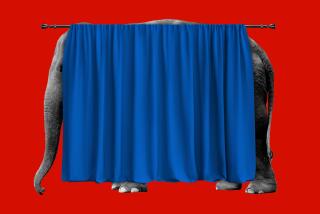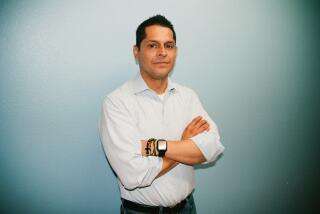Opinion: The Times endorsed Duran; Duran just endorsed Shriver. Now what?
It’s interesting, if not entirely unexpected: West Hollywood Councilman John Duran, the third-place finisher in the June 3 primary race for county supervisor, endorsed former Santa Monica Councilman Bobby Shriver over former state lawmaker Sheila Kuehl in the Nov. 4 runoff.
So given The Times’ endorsement of Duran, doesn’t it make sense that we’ll now endorse Shriver? But wait: Our Duran endorsement showed precious little enthusiasm for Shriver, and it praised Kuehl so highly that she used our non-endorsing words about her on campaign mailers (and was called out on it by one of my colleagues). So isn’t it pretty clear we’ll now endorse Kuehl?
The truth is, barely a month after the primary and with nearly four months to go until the general election, we haven’t talked about it yet. We will, though, and soon, and when we do, I suspect those are among the questions we’re going to grapple with. Not whether The Times editorial board should endorse Shriver just because Duran did — we don’t make our decisions that way — but rather: Are the qualities we saw and liked in Duran also present in Shriver, and did we somehow miss them? And not whether we meant the nice things we said about Kuehl, but whether she’s so head-and-shoulders above Shriver (figuratively, of course) that we’d endorse her without deeper vetting?
“On paper, it is not Kuehl but another candidate, former Santa Monica Councilman Bobby Shriver, who more closely resembles Duran,” The Times acknowledged in the May 15 endorsement. “Shriver has the same experience on a part-time city council and the same professed impatience for the status quo.”
But that’s just a surface similarity. It’s perhaps more germane that both Duran and Shriver can be disruptive, in the more traditional, frankly negative sense of that word — both have been known to indulge in the occasional tantrum — but also in the trendy business-hip sense, in which “disruptive” describes innovative thinking, a refreshing contempt for orthodoxy, a focus on results over process.
See, for example, pretty much any business magazine article in the last decade on the digital or tech industry or the sharing economy. “Disruptive technology” and “disruptive innovation” are concepts with roots in the 1990s and describes the fate of the Walkman, Blockbuster video, the Thomas Guide and newspaper classified ads in the face of innovative products that didn’t just serve customers better but made them change what they wanted. But it’s a notion that more recently has gone mainstream and that some are trying to inject into government — although it’s unclear for now whether the concept, describing the competitive marketplace, will ever quite fit in the public sector.
There is much about the massive bureaucracy that is Los Angeles County that cries out for disruption — in thinking, in policymaking, in returning value for the taxpayer dollar, in serving people, especially those living on the margins. Anyone who has followed the county’s sleepy response to the mental health crisis in the jails or the astoundingly slow pace of efforts to modernize probation camps can see the appeal of a little disruptive innovation.
The Times endorsement didn’t call Duran’s approach “disruptive,” but it did use words such as “shake up,” “fresh,” “innovative,” “pragmatic,” “spirited independence,” “impatience.” Implied is a willingness to defy bureaucracy, tradition, perhaps even political alliances, if any of those things come between the county and effective solutions to deal with poverty, crime and injustice.
So what about Shriver? Does he not have that same entrepreneurial bent, the same impatience with the time-worn way of addressing public sector challenges? Here’s what the editorial board said:
“But where Duran’s style is bracing, Shriver’s can be unnerving. While pursuing the admirable goals of serving veterans or ending homelessness, Shriver has too often gotten in his own way, needlessly antagonizing colleagues, city workers and others. His prescriptions for county government too often come in the form of blurts that show too little evidence that he understands the complexity of the county’s challenges and possible solutions.”
Responding Monday to The Times report that Duran was about to endorse Shriver, LA Observed looked back at our endorsement language and called it “striking for its sharpness.” Fair enough. The editorial board’s endorsement meetings with candidates are done off the record, but given our statements, I don’t think it’s breaking any confidences to say that Shriver did not make the best impression. Or that we didn’t believe he was just having a bad day.
Some of us may have seen in him more of the old-school kind of disruption, a sort of figurative bomb-throwing, rather than a smarter, more challenging call for new thinking and more effective ways of problem-solving.
But the runoff is a new election, and it would be worthwhile to give another look to both candidates. If we missed something in the first round, I’m quite sure we are prepared to be shown what it was.
As for Kuehl, one response just might be that this whole disruptive-thinking analogy is a bunch of hooey — the kind of thing thrown around at corporate retreats or motivational lecture tours, but just a euphemism for recklessness and a distraction from the hard and plodding work of policymaking and administration, especially in the public sector. An alternative response might that be that there’s nothing more creatively disruptive than legislation to require paid family leave, which just celebrated its 10th anniversary, or to do many of the other things that Kuehl has accomplished over the years.
More to Read
A cure for the common opinion
Get thought-provoking perspectives with our weekly newsletter.
You may occasionally receive promotional content from the Los Angeles Times.







